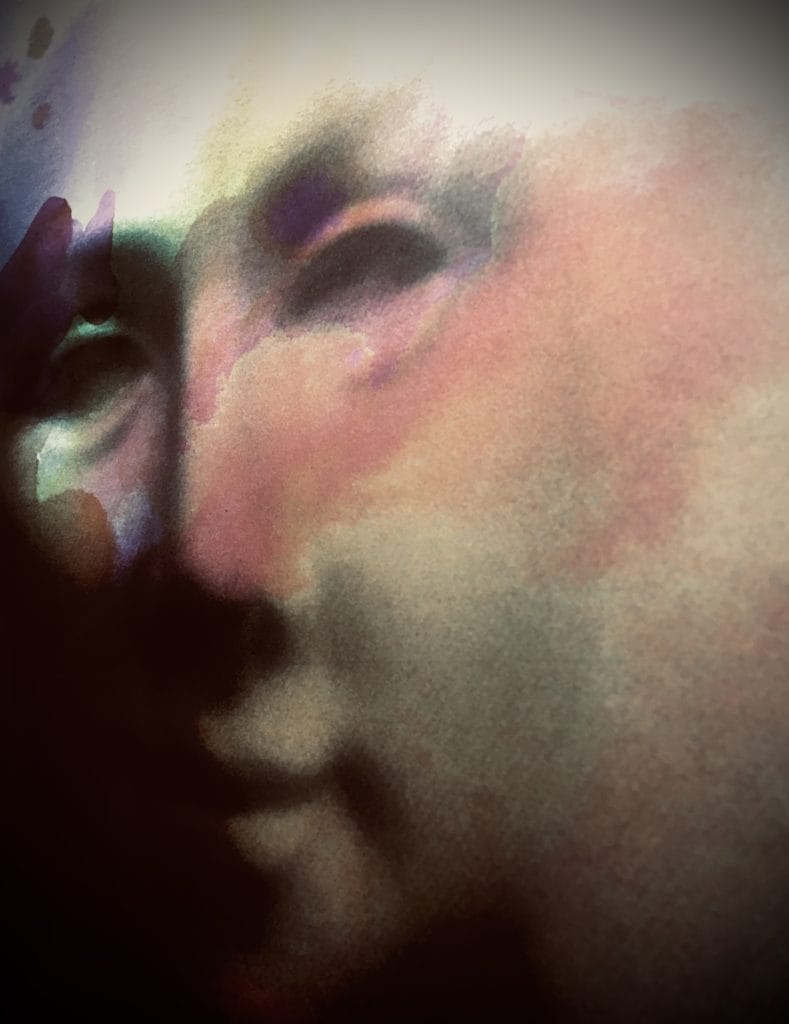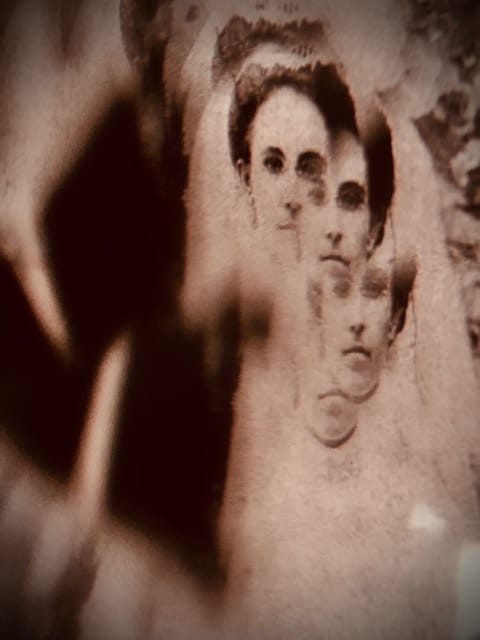July 2021 | poetry
Abnormal, a condition; a way of life; an indicator of otherness; you.
Achievement, you are the aggregate sum of these.
Anorexic, the condition of your identical twin sister in the seventh grade. You are the “fat twin.”
Appearance, how others may tell you your story.
Boston Marathon, a highly competitive race for which you qualify. You are still fat, however.
Bulimic, your condition in high school/college; your condition now.
Clean, the toilet. Thoroughly.
Cross-country, an unhealthy obsession; you are the slow twin. See Running.
Cry, on the bathroom floor. Be ashamed.
Cuts, on the first and third knuckles; see Reye’s Syndrome.
Cyclical, your behavior; other people’s behaviors; human behavior.
Dental problems, increased cavities, extreme sensitivity to hot and cold, wearing away of enamel, chipping of teeth. You have lost one tooth, to date.
Disorder, eating, familiarity.
DSM-5, a formal system of naming otherness; a reference book that cements your identity.
Eating, sin.
Exercise, over–, something you do that you do not realize until others point it out to you. Your husband tells you that it is abnormal to be on the treadmill at midnight.
Fat, a sub-elite state of being; indisputable proof of people’s laziness/gluttony/inferiority; see Appearance.
Hidden, everything.
Hunger, known.
Insist, that you are telling the truth.
Intervals, on the track. High school. You push until you see spots. You collapse in the grass. Your heartbeat nails you to the ground.
Jokes, junior high, Is your sister anorexic? Are you the fat twin? Ha, ha.
Kneel, before the toilet, a ritual.
Label, a human tendency.
Love, self–, elusive.
Lying, an art. You are good at it.
Medicine, Abilify, Clonazopam, Klonopin, Lexapro, Lorazopam, Orlistat, Phentermine, Prozac, etc., etc.
Nancy, For the Love of, a TV movie you are made to watch in junior high. It depicts Tracy Gold’s struggle with anorexia. Everyone in the room stares at you and your sister.
Overeating, a coping mechanism. You try this after your sister’s suicide attempt.
Overweight, you become this post-Boston Marathon, shocking everyone.
Perfectionism, elusive.
Performance, everything.
Purge, a skill. You do it well, and quietly.
Quacks, all the doctors. The therapist, the psychiatrist, the eating disorder specialist, the dietician.
Questionnaire, for the doctor, fill out. Lie.
Quiet, keep.
Racing Weight, a book by Matt Fitzgerald on how to get lean for performance.
Recovery, a visade.
Reye’s Syndrome, a chronic truth-teller.
Running, a tool; a compulsion. Something the eating disorder specialist says you must give up.
Scale, a taskmaster.
Secrets, many. Your sister’s suicide attempt.
Spectrum, eating disorder, you’ve dappled in it all.
Therapy-resistant, an accusation.
Unicorn, the logo of the Boston Athletic Association; see Perfectionism.
Void, feeling, the result of all your achievements.
Vomit, disgusting; abhorrent; do not talk about this.
Weight, how people may be judged and ranked accordingly.
Xeno–, other; different in origin; you.
You, lent your identity to an illness.
Zenith, the highest or most acute point of a condition. You: 96 pounds. Your sister: 84 pounds. Remember, you were always the fat twin.
Natalie Coufal
Natalie Coufal is a nonfiction and fiction writer from rural Central Texas. She is pursuing her M.F.A. in Creative Writing, Editing, and Publishing at Sam Houston State University where she has received a fellowship. Her work has appeared in Glassworks, 100 Word Story, Passengers Journal, Touchstone Literary Magazine, Prometheus Dreaming, and others.
July 2021 | poetry
Up the bent walk to
the house door, stops
at the steps, smells
the dryness of fall in
the late October air.
Remembers something
as the breeze tousles
his hair and forgets
for a moment the key
in his hand.
Something a young girl
said, maybe, or a
woman standing, breaking
a sprig of lilac,
turning: eyes damp.
We cannot know what
stops him, what holds
the key suspended in
his hand, his head
turned as if to listen.
As he would not say,
locked on that moment,
his face expressionless
to tell joy or grief,
tempered, far away.
Trent Busch
Trent Busch, a native of rural West Virginia, now lives in Georgia where he writes and makes furniture. His recent books of poetry, “not one bit of this is your fault” (2019) and “Plumb Level and Square” (2020) were published by Cyberwit.net. His poems have appeared in Best American Poetry, Poetry, The Nation, Threepenny Review, North American Review, Chicago Review, Southern Review, Georgia Review, New England Review, Crazyhorse, Prairie Schooner, Northwest Review, Kenyon Review, American Scholar, Shenandoah, Boston Review, and Hudson Review. His poem “Edges of Roads” was the 2016 First Place winner of the Margaret Reid Poetry Prize.
July 2021 | poetry
Heavy weighted blanket, legs half-out, rain against the window,
you whispered, “what if it gets old? what if you get bored
with me?”
“It won’t and I won’t,” I said.
“But if.”
“If?”
The smell of warm linen, chest swelling
like infatuation.
Oh honey, it would be a blessing
to grow old and bored with you
(just to be with you),
and should there be a loss of love
(I write love but mean passion, puppy-love)
in the years to come—
no wild nights into sleepless mornings, no constant hand-on-thigh,
no attentive eyes, no planned dates—
I would learn it again,
remind myself, reread my letters,
grow curious afresh,
in body, soul, and mind,
in duty and promise,
in decision and action,
even in dry periods with no joy,
Love you.
Alexandra T. O. Cooley
Alexandra T. O. Cooley is a poet and graduate student from Alabama. She is currently a pursuing an MA in English from Jacksonville State University and hopes to pursue an MFA in creative writing after graduating. She loves making lists, petting animals, and planning vacations with her husband, James.
July 2021 | fiction
That girl’s come again, the one called Jewel. She likes to correct me, says her name is Julie. I know. She’s my youngest granddaughter. That’s what she says. Like the others, she visits, like the others she says goodbye. Jewel comes often enough, I’m starting to expect her, and maybe it’s not just to say goodbye. She asks after my sleep, the food. It’s mud, I tell her. Jewel, who wants to be Julie, looks toward the window. For a change, it’s broken clouds, some blue sky, the snow gone elsewhere today. Nobody has to shovel. You must be glad you have a window. I like to look out. That chair makes it easy to watch the birds. Jewel walks over to the chair, presses a hand against the cushion, waits for it to push back. Very supportive. Go ahead, try it. No, Grandpa, it’s yours. Always like this. Yours. Mine. Theirs. Hard to know what to make of it. I’ll join you in a moment. Go ahead and open the window. Probably not supposed to. Only way to hear the birds. Jewel, who has black curls of hair pulled into a messy bunch, says, I can see them. Magpies? Perhaps. Well, you can’t hear what they are saying. What are they doing? Pecking between the cracks. Always looking for sunflower seeds, crumbs, stupid bugs. There’s one who has no tail. That’s Squirt. He steals whatever anybody leaves out there. Sometimes people don’t even realize they lost something. He took my watch and a ring I used to have on this here finger. Awful snug that ring. Not sure how he got it off. I rub and twist both sides of my finger. You can still see the mark it left. I swing my legs off the bed. Not as easy as it used to be. No faking that. Let me show you.
Connie Wieneke
Connie Wieneke’s prose and poetry most recently has appeared or is forthcoming in Weber, Talking River Review, Split Rock Review, Camas, Stand, and other journals. Her work also has appeared or is forthcoming in anthologies, including The Artists Field Guide to Yellowstone and Orison Anthology. Since 1983 she has lived in Wyoming.




